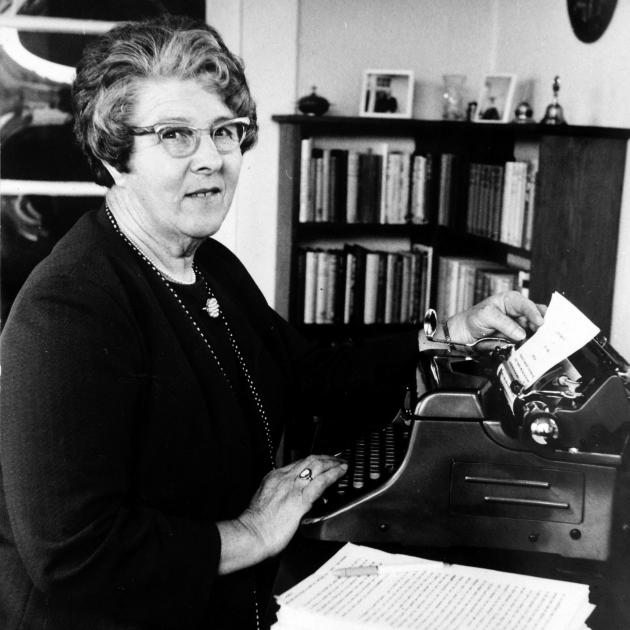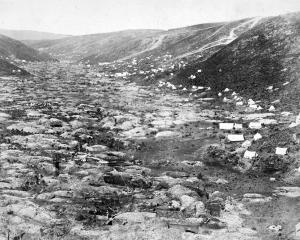
Why is New Zealand's most widely read author not celebrated in the province she loved and wrote about? Is it because, despite millions of books sold, Essie Summers was "just a romance writer''? Bruce Munro asks the questions.
A lanky, dark-haired teenager standing at the foot of Robbie Burns' statue in Dunedin's Octagon bows his head to the shiny, summer sky.
He peers through sunglasses at the bronze plaque set in brick pavers at his feet. The manhole-sized medallion marks the life and contribution of Witi Ihimaera, the first Maori novelist to be published. Ihimaera was also the Robert Burns Fellow at the University of Otago in 1975.
The teen wanders off and is replaced by a gaggle of camera-toting tourists who aim lenses at all points of the compass, capturing in high definition the central city heritage architecture.
They are oblivious to the memorial plate, and several others like it, beneath their Birkenstocked and Swoosh-adorned feet.
The plaques, more than a score in all, punctuate the upper Octagon's semicircle footpath. Each bears the name, a one-sentence biography and a sample of the words of a novelist, poet or publisher who had an association with, and brought reflected glory to, this Unesco-designated City of Literature.
James K. Baxter, Janet Fame, Hone Tuwhare and Roger Hall are memorialised alongside lesser known literary lights such as poet Lauris Edmond, Burns Club founder John Hamilton and writer A.P. Gaskell.
But where is the plaque on the Dunedin Writers Walk to salute New Zealand's most prolific and widely read author?
Why do we not know and celebrate this writer who spent most of her career here, lovingly representing Dunedin and Otago to an enthusiastic, worldwide readership?
Is it because Essie Summers, whose 56 novels were translated into 25 languages and sold 19 million copies, was a romance writer for Mills and Boon?
Summers was born in Christchurch, in 1912, and died in Taradale, Hawke's Bay, in 1998, at the age of 86.
Between those two dates, she spent 30 years in Otago - a decade in Weston, outside of Oamaru, and then two decades in Dunedin - building and cementing a stellar career as a writer of light romance.
Her hugely popular tales, with titles such as The Smoke and the Fire, Moon Over the Alps and The Forbidden Valley, were written around her duties as a Presbyterian minister's wife and mother of two.

Her stories were filled with romance, adventure and humour. Love inevitably won out over difficulties and misunderstandings. And the romantic backdrop to her tales was almost always set somewhere in Otago or Canterbury.
Maurice Gee, Janet Frame, Ngaio Marsh, Keri Hulme, Witi Ihimaera, Bill Manhire, Eleanor Catton, Katherine Mansfield ... all great New Zealand writers. But not one of them, or even all of them combined, come close to Summers' sales record, accumulated across 105 countries.
She was once well known enough to have a television documentary made about her; well known enough to turn down the offer of an MBE. (She just felt it was not her.)
But now she has all but disappeared from view. Especially in her home town.
At the southern end of Dunedin's main drag, beyond the Octagon, where shops with an eye to the past congregate, secondhand book stores still remember Summers.
Sharon Sculpher is the owner of Downtown Book Exchange, in Princes St.
She read Summers' Mills and Boon novels as a teenager, in the 1970s.
"I liked them because they were local. That was really cool,'' Miss Sculpher says.
"They were just nice stories. Not like now, with all the sex in them. Back then they actually had a story.''
She sells Mills and Boon paperbacks for $1 each, but puts a $6 sticker on Summers' titles.
There is still a small demand for her books, as much from tourists as from locals, she says.
This past week, Hard to Find Books, in Dowling St, has had one Summers book come in; the first in quite a while. The only other Summers title in its catalogue is a 1962, first edition, autographed, hardback copy of Moon Over the Alps. It is selling for $75 and has been waiting eight years for a buyer.
Back in Princes St, at Dead Souls Bookshop, owner Dean Havard says requests for Summers books are infrequent. But one afternoon several months ago he sold eight titles for $400 to an Australian visitor.
"She knew exactly which titles she did and didn't have. And she didn't quibble about the price,'' he says.
It appears the main repository of what little memory remains of Summers lies overseas.

That does not surprise Summers' daughter Liz Jack.
Her mother was an unrecognised tourism generator, Mrs Jack, a retired Milton school teacher says.
"People would say it's just soppy light romance, but there was this other side to it, writing about the country she loved."
And that love rubbed off, bringing people to southern New Zealand to see for themselves the places they had read about in her books.
"She loved writing. But she said people coming over because of her writing was her bonus.''
Her mother was "extremely positive and hugely outgoing'', Mrs Jack says.
"She was a bubbly, into everything, minister's wife. She loved people, so they loved her.''
If anything momentous happened, everyone knew about it right away.
One morning, in the family's Preston Cres home, a young Liz heard her mum shrieking, "Oh Bill, I'm going to faint, I'm going to faint''.
"I rushed in, and there were Mum and Dad dancing around the room,'' Mrs Jack recalls.
Summers held in her hand a letter stating one of her books was going to be serialised in the English Woman's Weekly and she was going to receive a handsome payment.
"I thought she had sliced an artery. I felt like hitting her,'' Mrs Jack says with laugh.
At the same time, her mother was a determined and disciplined writer.
"I remember as a young kid, I'd wake up and hear her typewriting and I'd go back to sleep knowing all was well.
"She used to get up at 5am every morning to write. Later, when we were older, she could devote the morning and afternoon to writing instead.''
Having an international best-selling romance writer for a mother was a boon during her teenage years.
"The timing was marvellous for me. Her first book came out in 1956, when I was 12.
"Here I was, with an endless supply of romance stories.
"I was reading them as she was typing the drafts. I would be saying, 'Hurry up, I've caught up'.''
Mills and Boon had a strict writing formula that dictated style and length. But Summers' success, and her friendship with Alan Boon, meant she was given licence on both those fronts.
Her mother's personality and values certainly came through in her writing, Mrs Jack says.
"Mum was quite feisty. Not in an aggressive way, and before women were taught to be assertive. But she was assertive in a nice way and believed in women having careers.
"So, her heroines were quite feisty, not soppy, and they had careers.''
Her 1964 novel The Smoke and The Fire is an excellent example.
Set in Dunedin, it is the story of a young Welsh woman, Dinah Pritchard, who emigrates to New Zealand to determine whether she will marry young lawyer Russell Milgrove. But things get complicated when she applies for a job as secretary to Dunedin businessman Anthony Bryn-Morgan.
"They drove up to Highgate, a road that ran right along the crest of a sharp hill above the city, from Roslyn to Maori Hill. Dinah's beauty-loving eyes feasted on it all. On the other side the hill dropped down to Kaikorai Valley, only to climb again to new housing areas on other hills till [sic] the houses lost themselves in the forestry of Three Mile Hill where it dipped down to the Taieri Plains. South, the valley stream flowed out to Brighton on the coast, with Saddle Hill, aptly named, guarding it ...
She wanted to giggle as Mr Anthony Bryn-Morgan rose from his chair as she was ushered in. He was broad rather than tall, but with a presence, an aggressively kindly presence, and had keen blue eyes, deeply graven lines in his cheeks and ... it was pretty certain that though he would now probably be described as sandy, he had once been a ginger-headed, freckle-faced urchin.
She had a feeling this interview was going to go with a bang.
It did.
Five minutes later Dinah was again subduing a rising temper and saying as icily as she could,"I beg your pardon, Would you mind saying that again? I can't possibly have heard aright''.
"I think you did. My father has misled me. I took it you were the plain, sensible type. He praised your efficiency and manner sky-high. He certainly knows I prefer older women, in fact that I insist on that. I can't understand him recommending you. He must be getting susceptible in his old age. I didn't think to ask your age on the phone, and your voice sounded so mature. I'm afraid you are much too young and ravishing to occupy a position in my office, Miss Pritchard.''
Tawny sparks appeared in the green eyes.
"It may surprise you, Mr Bryn-Morgan, that I have never been called ravishing before. Maybe when I've got over the shock I'll find it's a compliment. It had never occurred to me, either, that one must be plain to have brains, to be an efficient secretary. If that idea is prevalent in New Zealand, maybe I'd be better as a barmaid.''
Why has Summers slipped from sight? Perhaps it is because appetites have changed and her stories no longer ring the right bells. She chose to write her last four novels - the final one published in 1997 - for a different publisher who did not require such explicit sexual content. On the contemporaneity score, thousands of years of acclaimed writers would also miss the grade.
Maybe it is because her writing is not of a standard worth remembering. The late Prof Terry Sturm, editor of the Oxford History of New Zealand Literature in English, argued that was not correct.
Or, could it be that snobbery means Summers' unparalleled success still leaves her wanting because she was a Mills and Boon romance writer?

University of Otago's Emeritus Prof Lawrence Jones is a Victorian literature and New Zealand studies specialist and a former Montana Book Awards judge.
He relies heavily on Prof Sturm's assessment of Summers, which takes up more than four pages of his weighty, authoritative tome.
Literary snobs do consider Mills and Boon writing "a kind of joke''.
Prof Sturm, however, was in no doubt that popular and romance fiction should be part of the discussion about New Zealand literature, Prof Jones says.
The real question should be not which genre but rather what quality of writing, he said.
"With genre fiction, at one end it disappears into almost comic book-style writing. But when the characters get more substance and the sense of the places is created well, then it fits within a whole section that used to be called middle-brow fiction,'' Prof Jones says.
And what was Prof Sturm's assessment of Summers?
"He finds something of a formula in Essie Summers' writing, but also talks about how well she sketches in family relationships, how well she builds the sense of New Zealand places, especially rural places. And that this is of value in itself.
"He definitely took her seriously as someone working within a particular genre and doing it extremely well.''
Prof Jones is picking a change of fortunes for Summers.
"I would imagine she should be included on the Writers' Walk. And that [she is not], probably reflects the standard academic view on who is significant.
"For example, where people stand on Barry Crump is already changing, and within 50 years he could be viewed very differently, because the snobbish element will be gone.
"It will be interesting to see what history makes of her. I can see her novels will be of extreme historic value because they tell quite a bit about a certain layer of society.''
Summers did experience snobbery, Mrs Jack says. Most often she dismissed it with a chuckle.
But her biggest fan, her husband, took a different view.
When the documentary was being filmed in the 1970s, the television interviewer and crew took Summers back to old haunts in Christchurch, Weston and then Dunedin.
While in Dunedin, without telling Summers, they sought comment from a university English lecturer who was critical of her writing without having read any of her work.
"So when we were viewing it, up comes this piece that was really quite aggressively against the type of writing Mum was doing.
"I can remember Mum being pretty hurt about that because she felt she should have been told it was going to be in there.
"But Dad ... who was such a mild-mannered, delightful man ... was wild. He was really cross.''
Mrs Jack would like her mother to be better remembered in Dunedin and Otago.
In Christchurch, a retirement home is named after her, putting her on the same footing as Frances Hodgkins and Yvette Williams.
Also in that city, there is a plaque in Summers' honour near the inner-city Worcester St bridge.
But Mrs Jack is not sure a plaque for her mother would be welcomed in Dunedin.
People might think the Writers Walk should only be for "true literature'', she says.
"I don't know what their rules and regulations and standards are. It might be a bit like having a pop singer in an opera hall. I don't know.''

Nicky Page is the Dunedin City Council-appointed director of Dunedin's City of Literature enterprise.
Ms Page, who is two years into the job, is unsure why New Zealand's most widely read writer was not previously included on the Writers' Walk.
She is unsure whether snobbery was involved, but is certain there is none now.
"The City of Literature bends over backwards to be inclusive of all genres ... So, we don't have any sort of highbrow approach at all.''
City and university libraries have marked Summers career in the past, she adds.
Dunedin has "quite a few very strong contenders, just like her'' for the Writers' Walk.
"It's a good problem to have, that there's so many wonderful writers.''
But the walk was filling up, she added.
So, a working group was in discussion about that and other options to acknowledge the contribution of local writers, such as public art, pavers and park benches.
That was back in September.
This week, Ms Page says options are still being considered.
So, no happy ending yet.
Unless one has flicked forward to the last page of any of Summers' 56 books.
Her voice suddenly wobbled.
"Tony, I'm - I'm proposing to you ... in a bare little room in a police-station ... and you won't even turn around, you beast!''
... He swung around, his eyes still unbelieving, meeting hers across the yards of wooden floor between them. Suddenly the moment Dinah had dreamed of came, his blue eyes burned into her green ones ... then the space was no longer there, he was holding her close, he was laughing, he was exultant.
He said, "Dinah, darling!'' and bent his head.












